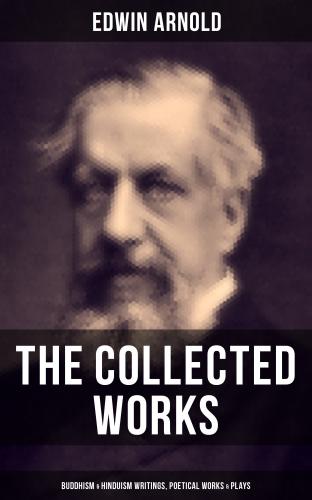In its present shape the "Mahâbhârata" contains some two hundred thousand verses. The style is forcible, often terse and nervous: the action is well sustained, and the whole effect produced is that of a poem written in commemoration of actual conflict between members of rival clans who lived somewhere southeast of the Punjab. In portrayal of character the Hindoo poem somewhat resembles its Grecian counterpart—the "Iliad"; the noble devotion and chivalric character of its chief hero, Arjuna, reminds us of Hector—and the wily, sinful Duryodhana, is a second Ulysses. The "Mahâbhârata" was probably begun in the third or fourth century B.C., and completed soon after the beginning of the Christian era.
The "Bhârata" war is a war between rival cousins of the house of Bhârata, a race of heroes mentioned in the Rig-veda collection. Duryodhana deprives his cousin Yudhisthira of his throne by inducing him to squander his fortune, kingdom, family, and self—and then banishes Yudhisthira and the latter's four brothers for twelve years. The gambling was conducted in an unfair manner, and the cousins feel that their banishment was the result of treachery, although pretended to be mercy in lieu of death. When the twelve years are over they collect armies of sympathizers, and on the Sacred Plain of the Kurus (the Holy Land of India) the great war is fought out. The good prevails, Duryodhana is slain, and Yudhisthira recovers his kingdom. This story is told so graphically that the "Mahâbhârata" still has the charm that comes from plot and action, as well as that of poetic beauty.
A concluding passage of this great poem says: "The reading of this 'Mahâbhârata' destroys all sin and produces virtue, so much so that the pronunciation of a single shloka is sufficient to wipe away much guilt. It has bound human beings in a chain, of which one end is life and the other death. If a man reads the 'Mahâbhârata' and has faith in its doctrines, he is free from all sin and ascends to heaven after his death."
The present selection is the episode of Nala and Damayanti. It is one of the most charming of the "Mahâbhârata" stories, and its Oriental flavor and delicacy have been well preserved by the translator, Sir Edwin Arnold.
L.F.C.
THE MAHÂBHÂRATA
NALA AND DAMAYANTI
Part I
A prince there was, named Nala, Virasen's noble breed,
Goodly to see, and virtuous; a tamer of the steed;
As Indra 'midst the gods, so he of kings was kingliest one,
Sovereign of men, and splendid as the golden, glittering sun;
Pure, knowing scripture, gallant; ruling nobly Nishadh's lands;
Dice-loving, but a proud, true chief of her embattled bands;
By lovely ladies lauded; free, trained in self-control;
A shield and bow; a Manu on earth; a royal soul!
And in Vidarbha's city the Raja Bhima dwelled;
Save offspring, from his perfect bliss no blessing was withheld;
For offspring, many a pious rite full patiently he wrought,
Till Damana the Brahman unto his house was brought.
Him Bhima, ever reverent, did courteously entreat,
Within the Queen's pavilion led him, to rest and eat;
Whereby that sage, grown grateful, gave her—for joy of joys—
A girl, the gem of girlhood, and three brave lusty boys—
Damana, Dama, Dânta, their names:—Damayanti she;
No daughter more delightful, no sons could goodlier be.
Stately and bright and beautiful did Damayanti grow;
No land there was which did not the Slender-waisted know;
A hundred slaves her fair form decked with robe and ornament—
Like Śachi's self to serve her a hundred virgins bent;
And 'midst them Bhima's daughter, in peerless glory dight,
Gleamed as the lightning glitters against the murk of night;
Having the eyes of Lakshmi, long-lidded, black, and bright—
Nay—never Gods, nor Yakshas, nor mortal men among
Was one so rare and radiant e'er seen, or sued, or sung
As she, the heart-consuming, in heaven itself desired.
And Nala, too, of princes the Tiger-Prince, admired
Like Kama was; in beauty an embodied lord of love:
And ofttimes Nala praised they all other chiefs above
In Damayanti's hearing; and oftentimes to him,
With worship and with wonder, her beauty they would limn;
So that, unmet, unknowing, unseen, in each for each
A tender thought of longing grew up from seed of speech;
And love (thou son of Kunti!) those gentle hearts did reach.
Thus Nala—hardly bearing in his heart
Such longing—wandered in his palace-woods,
And marked some water-birds, with painted plumes,
Disporting. One, by stealthy steps, he seized;
But the sky-traveller spake to Nala this:—
"Kill me not, Prince, and I will serve thee well.
For I, in Damayanti's ear, will say
Such good of Nishadh's lord, that nevermore
Shall thought of man possess her, save of thee."
Thereat the Prince gladly gave liberty
To his soft prisoner, and all the swans
Flew, clanging, to Vidarbha—a bright flock—
Straight to Vidarbha, where the Princess walked;
And there, beneath her eyes, those winged ones
Lighted. She saw them sail to earth, and marked—
Sitting amid her maids—their graceful forms;
While those for wantonness 'gan chase the swans,
Which fluttered this and that way through the grove:
Each girl with tripping feet her bird pursued,
And Damayanti, laughing, followed hers;
Till—at the point to grasp—the flying prey
Deftly eluding touch, spake as men speak,
Addressing Bhima's daughter:—
"Lady dear!
Loveliest Damayanti! Nala dwells
In near Nishadha: oh, a noble Prince,
Not to be matched of men; an Aświn he,
For goodliness. Incomparable maid!
Wert thou but wife to that surpassing chief,
Rich would the fruit grow from such lordly birth,
Such peerless beauty. Slender-waisted one,
Gods, men, and Gandharvas have we beheld,
But never none among them like to him.
As thou art pearl of princesses, so he
Is crown of princes; happy would it fall,
One such perfection should another wed."
And when she heard that bird (O King of men!)
